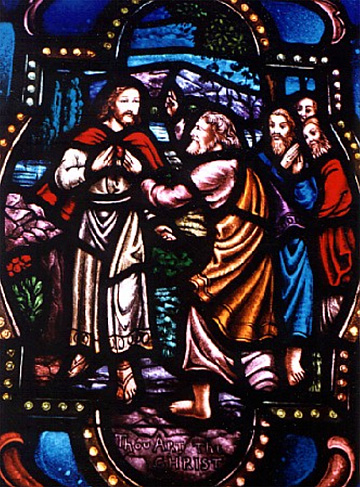In my last post, I began considering popular theories about why the early Christians considered Jesus to be divine. The first theory pointed to the fact that they thought of Jesus as Messiah and therefore Son of God. But I showed that, in the thought world of first-century Judaism – the world of the earliest believers in Jesus – both “Messiah” and “Son of God” were royal titles, pointing out Jesus’ divine anointing, but not his divine nature.
Perhaps the other popular theory espoused by many Christians points to the resurrection of Jesus as evidence of his deity. Here’s a version of that theory:
Theory #2: The early Christians believed Jesus was divine because of his resurrection.
According to this theory, the first Christians believed that Jesus was divine because they believed he had been raised from the dead. “Surely,” it is proposed, “human beings don’t rise from the dead. So the good news of Easter convinced the earliest Christians – as it convinces us today – that Jesus was in fact God.”
Now there is a grain of truth in this theory, as there was in the previous theory about the Messiah/Son of God. No doubt the resurrection of Jesus did figure significantly in the development of early Christian belief about Jesus’ deity. But the “resurrection therefore divine” argument is too simple to be correct, at least in its most common form. (Photo: My understanding of the resurrection of Jesus has been significantly aided by N.T. Wright’s magisterial The Resurrection of the Son of God. If you want to know something about how people in the time of Jesus thought of resurrection, you’ll find it in these 740 pages.)
For one thing, Jesus was not the only one to rise from the dead while he was on earth, yet we have no indication that any of the other “resurrected ones” were considered to be divine. Mark 5:21-43 tells the story of Jesus’ raising the dead daughter of the leader of a synagogue. The people were amazed, but didn’t think the girl was divine. Similarly, in John 11:1-45, Jesus raised his friend Lazarus from the dead. Many of those who observed this miracle put their faith in Jesus (11:45), but they didn’t deify Lazarus. Finally, Matthew mentions that many were raised from the dead when Jesus was killed (27:52-53). Yet, once again, nobody thought these people were divine. So, the “raised from the dead therefore God” formula doesn’t fit the context in which the first Christians came to recognize that Jesus was much more than a man. (I am aware, of course, that the resurrection of Jesus was of a different kind than the resurrections I have mentioned.)
Many Jews in the time of Jesus expected that, in God’s time, human beings would experience resurrection. Mark 12:18 notes that “Some Sadducees, who say there is no resurrection, came to Jesus . . . .” The implication is that this denial of resurrection set the Sadducees apart from many of not many if not most other Jews in the time of Jesus. Notably, the Pharisees believed in resurrection beyond death.
But the Pharisees were not alone in this belief. We find the idea of resurrection among the Old Testament prophets, most notably Daniel. Daniel 12 envisions a time in the future when “many of those who sleep in the dust of the earth shall awake, some to everlasting life, and some to shame and everlasting contempt. Those who are wise shall shine like the brightness of the sky, and those who lead many to righteousness, like the stars forever and ever” (Dan 12:3). The post-biblical book of Wisdom, written a couple of centuries before Jesus, affirms that “the souls of the righteous are in the hand of God, and no torment will ever touch them” (Wis 3:1). In time, “they will shine forth” and “will govern nations and rule over peoples” (Wis 3:7-8). The promise of resurrection emboldened Jewish people to die rather than abandon their faith in God. In 2 Maccabees, a man who is being tortured to death says, “One cannot but choose to die at the hands of mortals and to cherish the hope God gives of being raised again by him. But for you there will be no resurrection to life!” (2 Macc 7:14).
So, in the eyes of the first followers of Jesus, who were Jewish, of course, the resurrection of Jesus proved that he was righteous. It vindicated his life, his ministry, his message, and even his death. But it did not, at least at first blush, demonstrate that Jesus was God. The earliest Christians confessed that “God raised” him from the dead (Acts 2:24; Rom 10:9; 1 Cor 6:14), but they did not say that Jesus raised himself, thereby showing himself to be God.
I would certainly agree, however, that apart from the resurrection of Jesus, the early followers of Jesus would never have come to the conclusion that he was God in the flesh. In fact, there really wouldn’t have been any early followers of Jesus after his crucifixion, were it not for his resurrection. So the resurrection is crucial in the overall calculus that ends with Jesus’ deity. But the flow of ideas is more complex than the simple “resurrection therefore divine” argument that sometimes shows up in Easter sermons. Jesus could have been the Messiah/Son of God, and he could even have been raised by God on the third day after his crucifixion, without being divine. These things surely point in the direction of Jesus’ specialness, even his uniqueness, but more is required to get to his divinity.
I’ll get to this “more” later in this series. But before I do, I want to examine a very popular argument among secularists that purports to explain why the earliest Christians believed Jesus to be divine. I’ll deal with this in my next post in this series.

